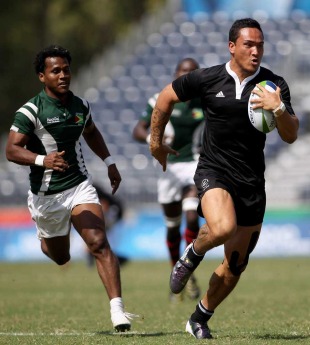|
International Rugby
Miller: Olympics success not down to big names
ESPNscrum Staff
April 5, 2011

All Black Hosea Gear played at the 2010 Commonwealth Games
© Getty Images
Enlarge
International Rugby Board (IRB) chief executive Mike Miller believes that Sevens' Olympic debut in 2016 will be a success with or without the 15-man game's star names. Given the demands of the IRB Sevens World Series and domestic competition there is precious little crossover between the codes, but the temptation will remain in Rio de Janeiro for Test ringers to replace seasoned Sevens players. At the 2010 Commonwealth Games in New Delhi, All Blacks Liam Messam, Zac Guildford and Hosea Gear were members of the winning New Zealand side, while Wallabies wing Lachie Turner picked up a silver medal with Australia. Miller accepts that coaches will face difficult decisions over selection but insists that their decision is their own. "It would be very difficult for teams to pick their better-known players," he said. "You'll have people who play Sevens on a regular basis in the World Series. They are professional Sevens players. If you have a good team, a settled team that knows each other, but the 15 guys suddenly think 'there's an Olympic medal available here, we want this', the coach has a decision to make. "Does he break up the team and bring someone in who may disrupt things, thinking 'he's a big name, can I turn him down'? It's very difficult and I wouldn't like to be a Sevens coach, especially in the year before the Olympics. "We understand that the appeal of the players is important, but if you're a coach you don't give a damn about appeal. All you care about is keeping your job. We need to build up stars in sevens, which we will do over the next couple of years. We will not tell teams who to pick, it's up to them to decide. "The fans who are new to rugby aren't going to know who Dan Carter or anyone else is anyway. Instead, they'll watch the sport and judge it by itself. People in the traditional countries, who love the sport, will watch it anyway. I don't think it's that important. Our issue is not whether the big names want to do it, but are they worth a place?" Miller believes there is little chance of Sevens emulating the success of Twenty20 cricket by encroaching into the popularity of 15-a-side rugby. "They are totally different games. In terms of 15s we already have a sport that is modern-era friendly," he said. "It's good for television and only takes a couple of hours to play. "If you're comparing something that takes five days to something that takes just several hours, that's a huge change. The difference between Sevens and 15s in that way, for TV, sponsors and fans, is nothing like the massive change that there is in cricket. Our view is that rugby will grow, whether it's sevens, 15s, beach, tag or touch - if we get a ball in people's hands and see it on TV." Miller's optimism over the growth of rugby comes on the day that the IRB announced the findings of a major report that showed a 19% increase in global participation since the 2007 World Cup. In Africa and South America significant increases of 33% and 22% respectively have occurred. While participation figures are highest in Europe, non-traditional playing nations in eastern Europe have also emerged, contributing to the 22% increase seen across the continent as a whole. Sevens' inclusion in the Olympic Games, event hosting strategies and IRB programmes and investment are given as the reasons for the increase. © ESPN Sports Media Ltd.
|
Live Sports
Communication error please reload the page.
-
Football
-
Cricket
-
Rugby
-
- Days
- Hrs
- Mins
- Secs
F1 - Abu Dhabi GP
Abu Dhabi Grand Prix December 11-131. Max Verstappen ()
2. Valtteri Bottas (Mercedes)
3. Lewis Hamilton (Mercedes)
4. Alexander Albon ()
5. Lando Norris ()
6. Carlos Sainz Jr ()
-
ESPNOtherLive >>
Golf - Houston Open
Snooker - China Open
Tennis - Miami Open

